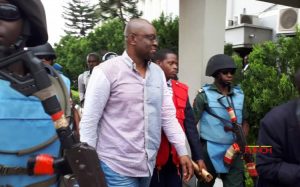The immediate-past Governor of Ekiti State, Mr Ayodele Fayose was on Monday arraigned by the Economic and Financial Crimes Commission for an alleged fraud of N2.2bn.
Fayose was arraigned before the Federal High Court in Lagos six days after he completed his tenure as governor.
He was taken to court from the custody of the EFCC where he had been detained for questioning after he voluntarily submitted himself on Tuesday, October 16.
Dressed in blue jean trousers and a shirt of purple, blue, white and grey colours, Fayose was brought to the court premises in a white EFCC bus, accompanied by security operatives.
He was immediately taken into the courtroom presided over by Justice Mojisola Olatoregun.
As he settled in a seat, Fayose smiled at journalists taking his snapshots with their mobile phones, asking, “Have you taken enough?”
On hand to give Fayose encouragement was a former Minister of Aviation, Chief Femi Fani-Kayode, who is himself being prosecuted by the EFCC for an alleged fraud of N4.9bn.
“I am here to let people know that he (Fayose) is not alone. I know what he’s going through because I’ve been there,” Fani-Kayode told journalists on the court premises.
Soon after entering the courtroom, Fayose was called up into the dock, where he took his plea on the 11 counts filed against him and his company, Spotless Limited.
He pleaded not guilty on behalf of himself and his firm, Spotless Limited, to the 11 charges bordering on criminal breach of trust, theft and money laundering.
In the charges, the EFCC alleged that on June 17, 2014, Fayose “took possession of the sum of N1, 219, 000,000 to fund your 2014 gubernatorial campaign in Ekiti State, which you reasonably ought to have known formed part of the proceeds of an unlawful act, to wit: criminal breach of trust/stealing.”
He was also alleged to have on the same day “received a cash payment of $5,000,000 from Senator Musiliu Obanikoro, the then Minister of State for Defence, which sum exceeded the amount authorised by law and you thereby committed an offence contrary to Sections 1 and 16(d) of the Money Laundering (Prohibition) Act, 2011 (as amended) and punishable under Section 16 (2)(b) of the same Act.”
In another count, Fayose was accused of “using an aggregate sum of N1,151,711,573 to acquire chalets 3 and 4; and 5 and 9 of the property situate at Plot 100 Tiamiyu Savage Street, Victoria Island, Lagos in the name of JJ Technical Service.”
Fayose was equally accused of purchasing a property at Plot 1504, Yedsema Street, Maitama, Abuja for N270m from one Rabi Kundili.
Among other allegations, the EFCC further accused Fayose of receiving gratification from a firm, Samchase Nigeria Limited.
After pleading not guilty to the charges, the prosecuting counsel for the EFCC, Mr Rotimi Oyedepo, prayed for a trial date and an order remanding Fayose in the prison custody.
However, the defence counsel, Chief Kanu Agabi (SAN), told Justice Olatoregun that while he agreed with a trial date, he was opposed to the prayer that his client should be remanded in the prison custody.
Agabi said he had already filed a bail application for Fayose and urged the judge to allow the former governor to return to the custody of the EFCC pending the hearing and determination of the bail application.
Justice Olatoregun granted Agabi’s prayer, ordered that Fayose should be remanded in the custody of the EFCC and adjourned till Wednesday, October 24, for the hearing of the bail application.
The EFCC has listed 22 witnesses that will testify against Fayose in the course of the trial.
They include Obanikoro and a former Group Managing Director of Diamond Bank Plc, Mr Alex Otti.
Otti is expected to tell the court how sometime in 2014, Obanikoro approached him in his Lagos office, saying he expected the Central Bank of Nigeria to pay certain sums of money into the Diamond Bank account of a firm, Sylvan Mcmanara Ltd, and that he needed the money or most of it transferred to Ekiti.
Otti is expected to tell the court how Diamond Bank offered to transfer the money electronically but Obanikoro insisted that he wanted the money delivered in cash in Ekiti. The bank then proposed a service charge of five per cent, which Obanikoro rejected and rather opted to fly the money by himself to Ekiti.
EFCC arraigns Fayose, remands him in custody till Wednesday






